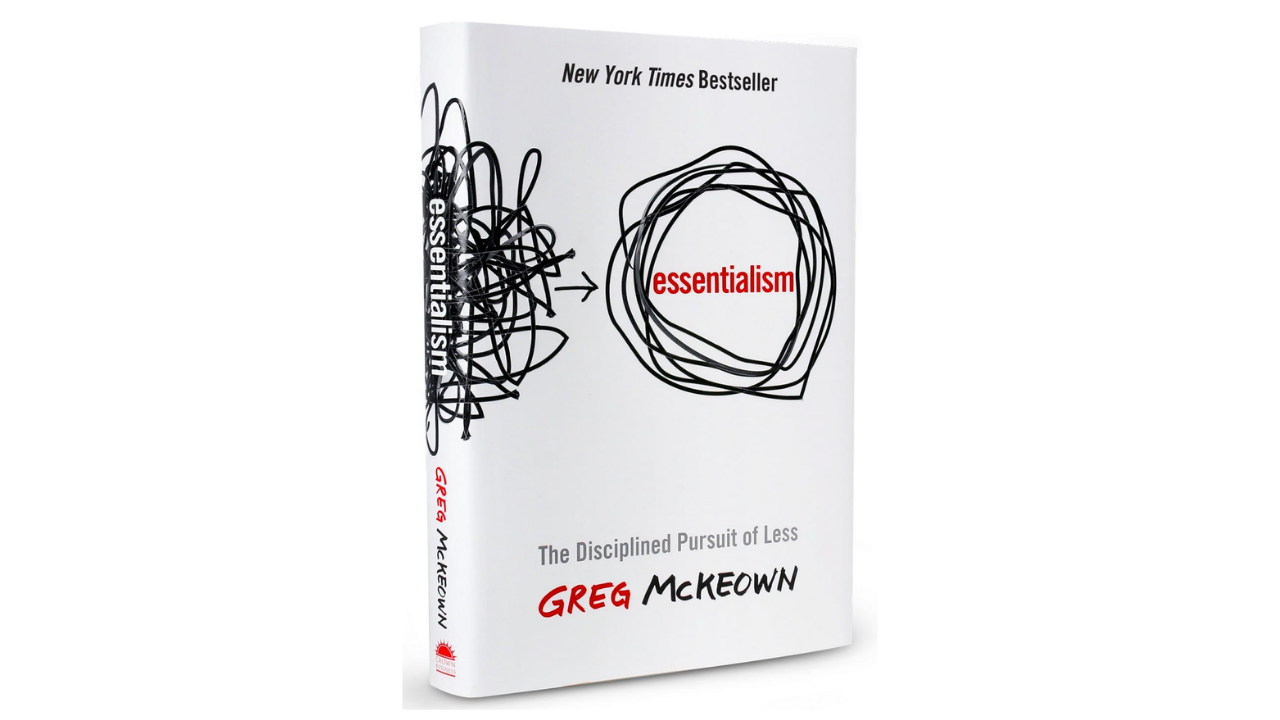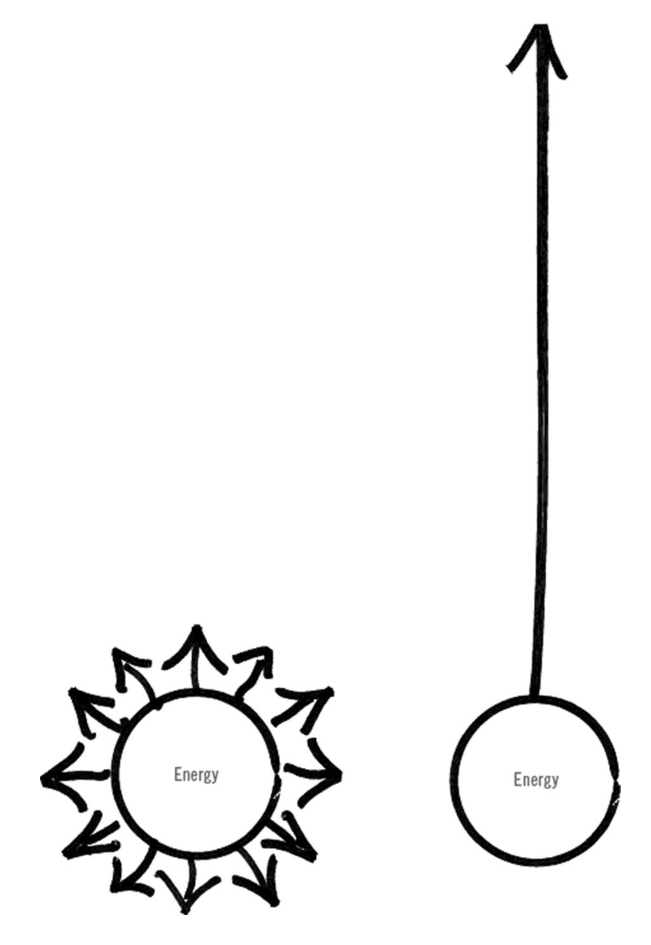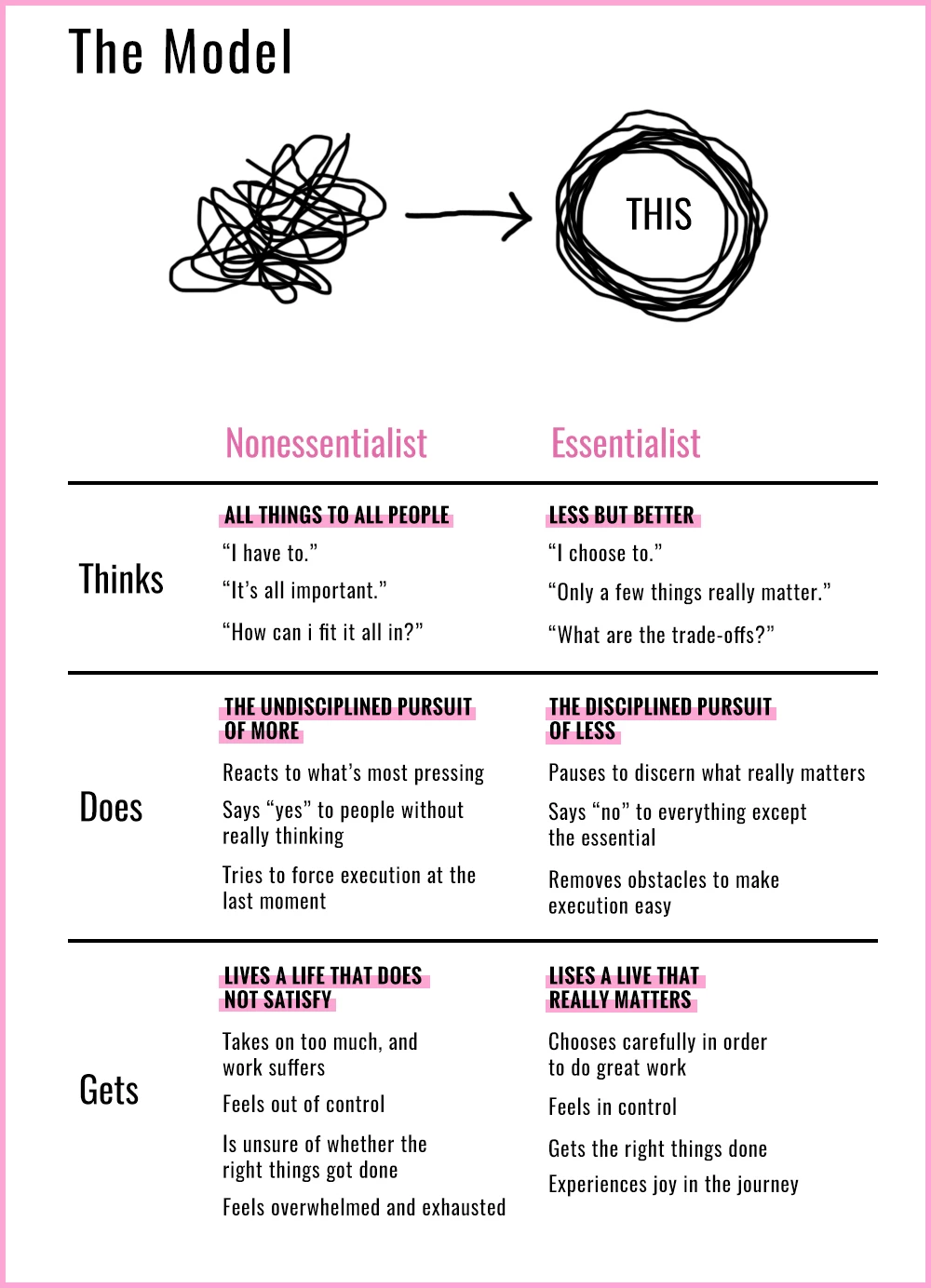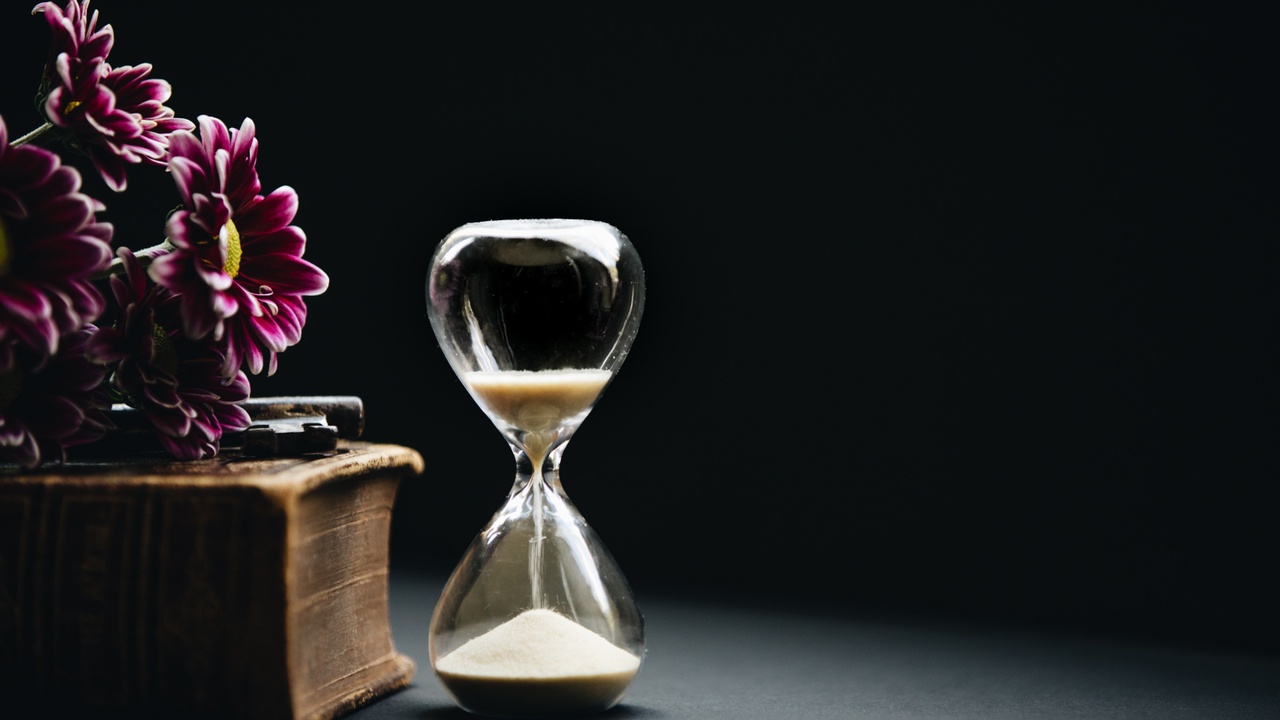
“The life of an Essentialist is a life lived without regret. If you have correctly identified what really matters, if you invest your time and energy in it, then it is difficult to regret the choices you make. You become proud of the life you have chosen to live. Will you choose to live a life of purpose and meaning, or will you look back on your one single life with twinges of regret? If you take one thing away from this book, I hope you will remember this: whatever decision or challenge or crossroads you face in your life, simply ask yourself, “What is essential?” Eliminate everything else.” - Essentialism: The Disciplined Pursuit of Less by Greg McKeown
On my journey of trading dentistry for entrepreneurship, I’ve been working to redefine my relationship with productivity, stress, and the balance between effort and ease. I’ve explored and reread books ranging from Do Less by Kate Northup to The 4-Hour Work Week by Tim Ferris. While many of these books share similar lessons, I found Essentialism to be the most practical and succinct teaching of them all in that it’s not about investing in more activities, it is about constantly asking if we are investing in the right activities.
Essentialism can be most simply defined as “less but better.” The key to Essentialism is in discerning what is absolutely essential through selective criteria, then eliminating the trivial many, so we can make the highest possible contribution toward the things that really matter. Essentialism empowers us to reclaim control of our own choices about where to spend our precious time and energy—instead of giving others the implicit permission to choose for us.
In this summary, I will share a very short recap of each of the four sections and finish with a practical ways to put Essentialism in action.
Part I: Essence: What is the core mindset of an essentialist?
-
Choose: The invincible power of choice
-
Discern: The unimportance of practically everything
-
Trade-off: Which problem do I want?
“Do you feel always in motion, but never getting anywhere?” Essentialism is the antidote to this, and a way to go from making a millimeter of progress in a million directions to significant progress in what matters most. The concept is easily explained in this drawing.

- Essentialism is a systematic way to discern what is important, eliminate what is not, and make doing the essential as effortless as possible.
- The way of the Essentialist means living by design, not by default or reactively. “If you don’t prioritize your life, someone else will.”
- This graphic featured in the book and recreated here clearly demonstrates the differences nonessentialist vs essentialist model.

Part II: Explore: How can we discern the trivial many from the vital few?
-
Escape: the perks of being unavailable
-
Look: see what really matters
-
Play: embrace the wisdom of your inner child
-
Sleep: protect the asset
-
Select: the power of extreme criteria
“To discern what is truly essential we need space to think, time to look and listen, permission to play, wisdom to sleep, and the discipline to apply highly selective criteria to the choices we make.”
- Escape: build thinking and quiet reflection time into our schedule to discern the essential few from the trivial many.
- Observe: journal to see patterns greater than the day-to-day. Identify the vital few. Pareto’s Law of the Vital Few: 20 percent of our efforts produce 80 percent of results.
- Play: Play leads to brain plasticity, adaptability, and creativity. Explore your past for play memories. What did you do as a child that excited you? How can you re-create that today?
- Sleep: Our highest priority is to protect our ability to prioritize. The problem with being sleep-deprived is that it compromises our ability to tell the difference, and thus our precious ability to prioritize. Sleep will enhance your ability to explore, make connections, and do less but better throughout your waking hours.
- Select: Apply selective criteria to force you to make decisions by design, rather than default. For every opportunity, ask “Will this activity or effort make the highest possible contribution toward my goal?”
Part III: Eliminate: How can we cut out the trivial many?
-
Clarify: one decision that makes a thousand
-
Dare: the power of a graceful "no"
-
Uncommit: win big by cutting your losses
-
Edit: the invisible art
-
Limit: the freedom of setting boundaries
“The main thing is to keep the main thing the main thing”—Steven Covey.
- Clarify: Essential intent is one decision that settles one thousand later decisions. How will we know when we are done or have succeeded?
- To eliminate nonessentials means saying no to someone and pushing against social expectations. To do it well takes courage and compassion. So eliminating the nonessentials isn’t just about mental discipline. It’s about the emotional discipline necessary to say no to social pressure.
- It takes courage to say no and overcome our hardwired desire to please others. It can also be hard to say “no” due to sunk-cost bias, which is the tendency to continue to invest in something we know is a lost cause simply because we have already sunk a cost that cannot be recouped. An Essentialist has the courage and confidence to admit his or her mistakes and uncommit, no matter the sunk costs.
- When deciding what activities to eliminate ask: “If I didn’t have this opportunity, what would I be willing to do to acquire it?”
- Focus on the trade-off or opportunity cost of commitments. Remember that saying “no” allows more space for better things.
- Say “no” often require trading popularity for respect.
- When offered an opportunity, create a pause so you can evaluate if it aligns with your vital few. To say no, express appreciation and politely decline. Perhaps offer a trade-off or alternative. “I can’t do it, but X might be interested.”
- Be as clear and concise as possible.
- Only engage in activities with high value, meaning, or return.
- Course correct by comparing core purpose with actual behaviors.
- Know when to show restraint and resist the tendency to step in. Observe more than you share.
- Question the status quo and don’t do things just for the sake or routine. Are there commitments you commonly make to friends, family, or colleagues that you have always assumed made a big difference to them but in fact, they might barely notice? Eliminate these.
- Clear boundaries allow us to proactively eliminate external demands that distract us from the true essentials. Clear social contracts and boundaries allow everyone to make their highest level of contribution while maintaining good terms.
Part IV: Execute: How can we make doing the vital few things almost effortless?
-
Buffer: the unfair advantage
-
Subtract: bring forth more by removing obstacles
-
Progress: the power of small wins
-
Flow: the genius of routine
-
Focus: What's important now?
-
Be: the essentialist life
“TO ATTAIN KNOWLEDGE ADD THINGS EVERY DAY. TO ATTAIN WISDOM SUBTRACT THINGS EVERY DAY.” —Lao-tzu
- Once you’ve figured out which activities and efforts to keep—the ones that make your highest level of contribution—you need a system to make executing your intentions as effortless as possible. Essentialists invest the time they have saved into creating a system for removing obstacles and making execution as easy as possible. By making a one-time investment in removing obstacles, we can solve problems and reduce our efforts to maximize results.
- The Essentialist looks ahead, plans, prepares for different contingencies, expects the unexpected, and creates a buffer to prepare for the unforeseen, thus giving herself some wiggle room when things come up, as they inevitably do.
- Buffers reduce the friction caused by the unexpected. Prepare by planning:
- What risks do you face on this project?
- What is the worst-case scenario, and the social and financial impacts of the worst-case scenario?
- How can you invest to reduce risks or strengthen financial or social resilience? How can I over-prepare?
- What is the time estimate? To overcome “planning fallacy,” add 50% to your time estimate.
- Be clear about the essential intent: How will we know when we are done?
- Remove the “slowest hiker:” What is the obstacle that, if removed, would make the majority of other obstacles disappear? By removing this constraint, you significantly reduce the friction keeping you from executing what is essential.
- Progress is the most effective form of motivation because a small, concrete win creates momentum and affirms our faith in our further success. Start small and celebrate progress. Focus on minimal viable progress and preparation: “What is the smallest amount of progress that will be useful and valuable to the essential task we are trying to get done? What is the minimal amount I could do right now to prepare?”
- Routines are a powerful tool for removing obstacles. As we repeatedly do a certain task the neurons make new and stronger connections and it becomes easier for the brain to activate them. Routines also allow mental work to shift to the basal ganglia, and mental space is freed up to concentrate on something new. Instead of spending our limited supply of discipline on making the same decisions again and again, embedding our decisions into our routine allows us to channel that discipline toward some other essential activity.
- Habits are built by cue, routine, and reward. Build better habits by changing or creating new cues. Develop a routine of doing your hardest task in the day first thing in the morning. Time-block to divide your days/weeks into themes so you can focus your energy instead of feeling pulled into everything. Start with one change in your daily or weekly routine and then build on your progress from there.
- “When faced with so many tasks and obligations that you can’t figure out which to tackle first, stop. Take a deep breath. Get present in the moment and ask yourself what is most important this very second—not what’s most important tomorrow or even an hour from now. If you’re not sure, make a list of everything vying for your attention and cross off anything that is not important right now.” Ask:
- What’s important now?
- What do you need to do to be able to go to sleep peacefully?
- What might you want to do someday as a result of today?
- Essentialism is a simpler way of doing everything in a way that really matters. Here are some of the ways the disciplined pursuit of less can change your life for the better.
- More clarity over what really matters. Life will become less about rushing to cross off a to-do list and more about changing what you put on there in the first place.
- You will gain confidence and control in your ability to pause, push back, or not rush in.
- While other people are living a life of stress and chaos, essentialists live a life of impact, fulfillment, presence, and joy.
Essentialism in Action
Quarterly
- Escape: Schedule a quarterly personal day to refocus vision, goals, habits, commitments, and plans on the essential
- Clarify: Spend time getting clear on your purpose, defining the end goal/vision (how will we know when we are done or have succeeded?), and set selective criteria for things necessary to achieve this
- Flow: Starting with a blank one-week calendar, design your Dream Routine: how you want to spend your time each week.
- Select: Filter new opportunities through strict criteria, consider the opportunity cost, and practice saying “no” gracefully
- Uncommit: Look at each commitment on your calendar. Ask, “If I wasn’t already involved, how hard would I work to get involved now?”
- Edit: If you add a new activity, you need to edit out an existing activity to make space for it.
- Subtract: When you face an obstacle, instead of pushing harder against it, ask, “How can I remove this obstacle altogether?”
Daily
- Discern: Before starting work, ask “What is the most important thing I can do today? What is the obstacle that, if removed, would make everything else easier or unnecessary?”
- Recognize choice: Replace “I have to” with “I choose to”
- Focus: Pause once a day and ask yourself, “What’s important now?”
- Play, Rest, Sleep: Intentionally spend a few minutes every day with a child, pet, or yourself discovering the magic of games, music, art, etc. Take a 20-minute nap or practice Yoga Nidra. Prioritize a digital sunset and 8 hours of sleep.
- Buffer: Add buffer time on your calendar to handle the unexpected problems and opportunities that come your way.
- Observe & Celebrate Small Wins: Start a journal and write only two sentences at the end of each day. “What’s the most important thing and one small win that happened today?”
If you enjoyed this post and want to read more about optimizing well-being, check out some of my other posts!






